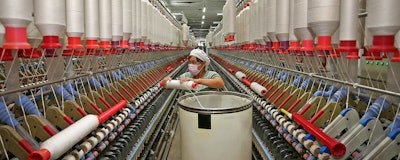
 Kayla Matthews
Kayla Matthews Countries around the world are working to implement new climate change controls to lower their energy costs and help reduce the speed of global temperature rise.
While these measures will potentially help slow the rate at which climate change occurs, the impacts as a whole aren’t entirely known. Fortunately, scientists are making headway with new research into how climate will affect the world’s industries overall.
Historically, the majority of climate change research focused on impacts to the agricultural industry. Scientific research on the effect of global climate change on manufacturing wasn’t considered until now.
UC Santa Barbara scientists published new findings demonstrating that climate change will negatively impact manufacturing in China by reducing output by as much as 12 percent annually.
Research Methodology
Researchers analyzed data from approximately 500 million factories from a period of 11 years, ranging from 1998 to 2007. The team considered the impact of global temperature change on how manufacturers would produce products.
They concluded that by 2050, if no changes are implemented, China’s manufacturing production rate will decrease by 12 percent, which equates to nearly $40 billion lost in 2007 currency.
Reduced Efficiency
As temperatures continue to rise, workers in factories won’t be able to perform their duties as efficiently as they would in more temperate conditions.
Despite air conditioning and other amenities, scientists found worker productivity will continue to decline. In turn, this will lead to lower production rates. Mechanical operations will also experience a negative impact.
Machinery has an optimum temperature range in which it operates most efficiently. When temperatures rise beyond this ideal range, the efficiency begins to decrease. The researchers demonstrated that regardless of the climate controls available, all types of manufacturing, including both low and high technology sectors, will be affected equally.
Economic Impacts
China provided approximately 12 percent of the world’s imports in 2014. A significant reduction in manufacturing capacity will substantially lower the available supply and in turn, drive up the costs of imports for countries around the globe.
Countries that are accustomed to the affordable goods produced by China may need to supplement their demand from other sources or seek supplies elsewhere if they become available.
Additionally, manufacturing accounts for nearly 32 percent of the Chinese GDP. Losing manufacturing capabilities will eliminate jobs and negatively impact the Chinese economy.
The predicted 12 percent decrease in manufacturing would account for an overall decrease of 4 percent in China’s total GDP. Chinese consumers will also have less available money to spend, which in turn will negatively impact the economy even more.
Trade Reduction
Many countries trade with China. In fact, in 2014, China performed over 10 percent of global trade, the most of any country in the world. A decline in manufacturing capabilities will slow China’s economy and negatively impact trade around the globe.
Chinese citizens won’t be able to afford as many international goods, and their overall demand for foreign products will decrease. Countries that do business with China will begin to realize lower GDPs as well, and see a decline in their global economy. The decrease in GDP of the countries that do business with China will also affect other countries, as well as their citizens, who will also have less disposable income.
China is already working to reduce its greenhouse gas emissions and implement various climate controls.
The new research presented on how climate change affects manufacturing may inspire China to develop stricter methods and take more drastic measures to reduce its carbon footprint.
Kayla Matthews is an independent technology writer at Productivity Bytes.


















